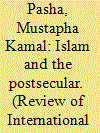| Srl | Item |
| 1 |
ID:
089813


|
|
|
|
|
| Publication |
2009.
|
| Summary/Abstract |
Islamic exceptionalism (IE), or the discourse of Islam's inassimilable difference, legitimizes post-9/11 encounters with Islam and strategies of political and cultural domestication of the Islamic cultural zones (ICZs). It may also furnish new grounds for exclusions, enclosures and securitization. The aim of this paper is to explore the principal vectors of the field of vision generated by IE; to draw out any possible connections between IE and a presumed global exception (GE); and more broadly, to delineate how IE speaks to the perils of International Relations (IR)'s occlusion of the political in ICZs. In exploring the nexus between IE and GE, both the recursive character of GE and its constraints are noted, with an appreciation of cultural mappings nourishing GE. The key implication drawn is the need to avoid the temptation of an abstract notion of GE without ample recognition of its particularized instantiations, notably in reference to Islam.
|
|
|
|
|
|
|
|
|
|
|
|
|
|
|
|
| 2 |
ID:
117461


|
|
|
|
|
| Publication |
2012.
|
| Summary/Abstract |
The language of the 'postsecular' acknowledges the enduring presence of faith in politics, repudiating secularisation theses claiming diminution or privatisation of religion in social and political life. In cognitive and experiential worlds, those presumably unfettered by these conceptions (for example, the Islamic Cultural Zones or ICZs), the postsecular presents a different order of challenge and possibility. The term ICZs refers to Muslim majority areas informed by transnational subjectivities loosely connecting varied Islamic societies around symbolic commonality, memory, and historical experience. The term stresses the plurality of Islamic cultural experience, albeit distinguished by recognisable semiotic markers, without essentialising Islamic identity. This article questions the hegemonic view pervasive in both secular and postsecular theorising of the fiction of immutability of faith in the ICZs and recognises its rupture and displacement under conditions of late modernity. The ontological dislocation in the character of religion itself under conditions of late modernity opens up the possibility to account for the assumed resistance of Islam to secular modernity, but also to explain Islam's imbrications in politics read under the sign of Political Islam. Paradoxically, under the condition of late modernity, a more homogenised Islam appears to crystallise in the ICZs at odds with an 'open' Islam.
|
|
|
|
|
|
|
|
|
|
|
|
|
|
|
|